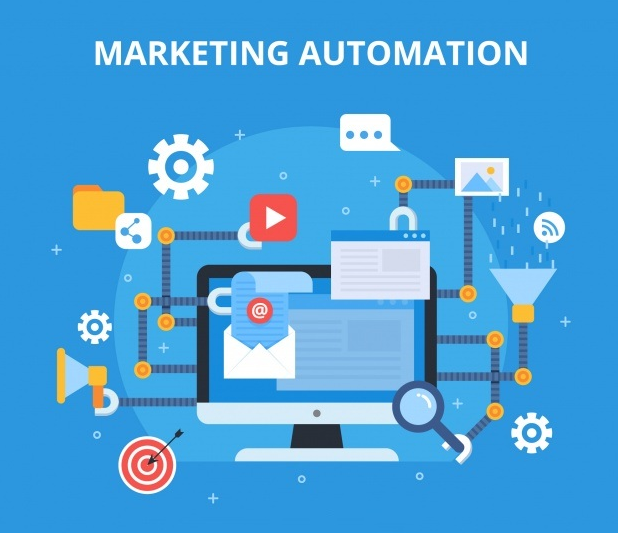Marketing automation is designed to help you automate repetitive tasks so you can save time and work more efficiently. According to Email Monday, as of 2019, 51% of companies are using automated marketing tools. More than half of B2B companies are also planning to adopt marketing automation tools.
As with any product or service, picking a tool requires research and careful thought. In this article, we'll discuss four things you need to look at before making that critical decision. Let’s start with a definition of marketing automation.
Marketing Automation: A Definition
According to Techopedia, marketing automation is the “use of software and web-based services to execute, manage, and automate marketing tasks and processes.” Marketing automation tools perform these other functions:
- Workflow management
- Marketing intelligence
- Web-based archive and real-time traffic analysis
- Lead management, scoring and nurturing
- Data orchestration
- Built-in or integrated CRM
- Marketing campaign monitoring
It’s easy to see then what benefits a company can get from marketing automation. Omnisend lists these five benefits:
- Reduced costs: marketing automation tools optimize workflow, which saves time and money
- Flexibility: you can set up a campaign and let it run with limited oversight
- Improved oversight: easily monitor the outcome of a campaign through an analytics dashboard
- Reliability: human error is virtually eliminated once a campaign is up and running
- Non-repetitive content: you don’t have to spend time doing repetitive tasks
Most marketing tools offer a degree of automation. This automation results in clear benefits for
Having said that, let’s go back to our original question: What are the things to consider when choosing a marketing automation tool? Here are four.
1. Choose a Tool With the Features You Need
There are two times you are likely to start using a new tool. The first instance is when you are looking for a tool to fulfill a new function in your company. For example, you might choose to use a clock timer app. This will be the first time you use a software solution.
If this is the case, spend time researching the tools currently available in the marketplace. Consider the functionality that you think you need, and compare this against the features they offer. You can use a combination of sources during this research stage to find the best solution. The process you go through will probably look something like this:
- List Posts: Google “best + software + the year”
- Software Review Sites: Cross reference the tools you find on popular review sites
- Visit the Site: the final step is visiting the site and testing the tools
At the end of the initial research, draw up a list of the features you want. Then choose the platform that offers the right combination of features at the best price point.
The second instance you will look for a new tool is when you decide to move over from your existing solution to another platform. In the case of the latter, you should have a clear idea in your head of the marketing automation features you need. You might even have a wishlist of the kind of automation features you want.
The research process will probably look pretty similar to the former, it’s just you’re going to have clearer insights about what you’re looking for. This is when getting a product demo comes in useful, as you’ll be able to ask their support staff insightful questions.
2. Can it Integrate With Your Other Automation Tools
The average company spends 2.5% of its revenue on IT. This spending is generally split between hardware, computers and servers, and software. And we use a lot of software platforms.
At ZoomShift for example, I’m personally using seven different software platforms on a day to day basis. Of course, if you can get these tools to play nicely together, you can generally improve your productivity. It’s important therefore, to check if the new tool you are considering integrates with the other platforms. After all, if it doesn't, you will have wasted time and resources in the purchase.
You can check if the software has an integration by reviewing the APIs. The ability to integrate tools is especially important for customer support if you’re trying to manage an omnichannel experience, and for CRM.
The well established tools in these sectors, like Hubspot, have hundreds of integrations. Newer tools tend to have less integrations.
3. Lifetime Deals Versus Software as a Service
When choosing a marketing automation tool for your business, cost and reliability are two of the most important factors. Most online businesses these days run on a Software as a Service model. This means they charge a monthly recurring fee for access to their platform.
The most established companies in a sector will generally charge the highest price but offer the most reliable service. If reliability is the most important factor, then you should probably use a well-known software marketing platform. These will generally have the most integrations and the fewest bugs.
However, the cost might be a more important factor for you. This is especially true for startups and scale-ups that want to stretch their budgets. If this sounds like you, then you’ll want to check out some of the online deal sites that specialize in lifetime deals include AppSumo and StackSocial. You can visit these sites periodically to check what deals are available.
I like to use this Google Chrome extension that collates some of the best software deals on the web in your browser. It’s a pretty handy tool.
While the lifetime deals option is cheaper, the software options you find generally have more bugs. They also support fewer integrations.
4. Check the Responsiveness of Customer Support
Most of the time, the software applications you use will work fine. Of course, that’s not always the case. Bugs do happen, and it can be frustrating and even costly when they impact your business operations.
This is why active and effective customer support is so important. When picking a marketing automation tool, then make sure to check the responsiveness of customer support.
There are some logical ways to go about this and things to consider. Firstly, you need to know what channels the customer support team uses. Some companies restrict support queries to email; others offer live chat and other alternatives.
For non-essential tools, I find email sufficient. I don’t mind delays in the customer support response time if it’s not impacting the business. For more important tools, like a CRM, I want a responsive customer support team that I can access on multiple channels. You’ll need to make this same analysis to determine if the customer support is what you need for that tool.
In addition to considering the channels that a company is using, it’s worth checking out the review sites. You can be shocked to see the customer support reviews a company is receiving. Equally, you might be pleasantly surprised that the customer support is really responsive.
Picking a Marketing Automation Tool in 2020
In this article, we saw the importance of marketing automation. Marketing automation is no longer a luxury. It is a necessity. This is not surprising since marketing automation tools allow companies to deal with many business aspects. Contrary to popular perception, marketing automation does not only deal with email or social media scheduling.
When picking a marketing automation tool, there are several things to consider. These are the tool’s features, its ability to integrate with other existing automation tools in the company, its social media capacity, and the availability of customer support.
The main takeaway is this: As with any other product or service, choosing a marketing automation tool requires that you conduct the proper research and weigh your options. But if you follow these tips, there’s no reason you won’t end up with a tool that is just a godsend for you and your business.
Bio: Owen Jones is the Senior Content Marketer at Zoomshift, an online schedule maker app. He is an experienced SaaS marketer, specializing in content marketing, CRO, and FB advertising.


 Table of Content
Table of Content










